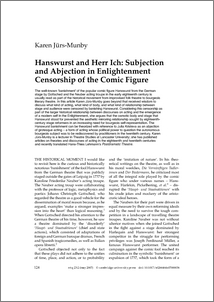Hanswurst and Herr Ich: Subjection and Abjection in the Enlightenment Censorship of the Comic Figure.
Jürs-Munby, Karen
(2007)
Hanswurst and Herr Ich: Subjection and Abjection in the Enlightenment Censorship of the Comic Figure.
New Theatre Quarterly, 23 (2).
pp. 124-135.
ISSN 1474-0613
![[thumbnail of download.pdf]](https://eprints.lancs.ac.uk/4232/1.hassmallThumbnailVersion/download.pdf)

Preview
Abstract
The well-known ‘banishment’ of the popular comic figure Hanswurst from the German stage by Gottsched and the Neuber acting troupe in the early eighteenth century is usually read as part of the historical movement from improvised folk theatre to bourgeois literary theatre. In this article Karen Jürs-Munby goes beyond that received wisdom to discuss what kind of acting, what kind of body, and what kind of relationship between stage and audience were censored by banishing Hanswurst. Considering this censorship as part of the larger historical relationship between discourses on acting and the emergence of a modern self in the Enlightenment, she argues that the osmotic body and stage that Hanswurst stood for prevented the aesthetic mirroring relationship sought by eighteenth-century stage reformers in an increasing need for bourgeois self-representation. The Hanswurst banishment can be theorized with reference to Julia Kristeva as an abjection of grotesque acting – a form of acting whose political power to question the autonomous bourgeois subject was to be rediscovered by practitioners in the twentieth century. Karen Jürs-Munby is a lecturer in Theatre Studies at Lancaster University; she has published articles on theories and discourses of acting in the eighteenth and twentieth centuries and recently translated Hans-Thies Lehmann's Postdramatic Theatre.
Item Type:
Journal Article
Journal or Publication Title:
New Theatre Quarterly
Additional Information:
This article explores the well-known 'banishment' of the popular comic figure Hanswurst from the German stage by Gottsched and the Neuber acting troupe in the early eighteenth century, usually read as significant for a historical move from improvised folk theatre to bourgeois literary theatre. This article goes beyond this initial assessment to discuss what kind of acting, what kind of body and what kind of relationship between stage and audience were censored by banishing Hanswurst. The piece is related to output two, in that it considers this censorship as part of the larger historical relationship between discourses on acting and the emergence of a modern self in the Enlightenment. The Hanswurst banishment is theorised with reference to Julia Kristeva as an abjection of grotesque acting ' a form of acting whose political power to question the autonomous bourgeois subject will be rediscovered by practitioners in the twentieth century. Earlier versions of this article were presented at the International Conference 'Clowns, Fools and Picaroes' in Belfast, 2003 and by invitation as an extended lecture at the Glamorgan research seminar 2004. RAE_import_type : Journal article RAE_uoa_type : LICA
Uncontrolled Keywords:
/dk/atira/pure/subjectarea/asjc/1200/1213
Subjects:
?? visual arts and performing artsnx arts in general ??
Deposited On:
29 Feb 2008 11:32
Last Modified:
10 Dec 2025 21:38